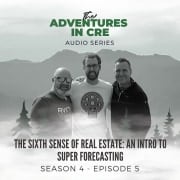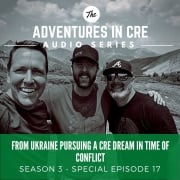RV@Olympic – A Firm Ridge Development | S4E7
In this episode of the A.CRE Audio Series, led by Michael, who is working on an RV Park development with Firm Ridge, the guys talk about the burgeoning RV park market. RV parks can serve as a good investment opportunity, as they are flexible, short-term ground lease opportunities with guests bringing their own RVs. Michael’s RV Park development strategy focuses on developing a portfolio of RV parks close to national parks, capitalizing on the soaring demand for RV ownership and rentals coupled with limited supply.
Watch, listen, or read this episode to learn about the RV Park market and Michael’s RV@Olympic development with Firm Ridge.
RV@Olympic – A Firm Ridge Development
Or Listen to this Episode
Resources from this Episode
Episode Transcript
Sam Carlson (00:00):
Last season, we talked about… So season three, that was about two years ago did we figure out? It was a bit, but we talked in that season. That was one of my favorite seasons before this one of course. But we talked about deal making and deal doing, and that was really fun because we went through a lot of hypotheticals and got to go through the different things that happen when you’re putting a deal together and whatnot. But this season and what I’m really excited about, this episode is where we’re going to really kick into real deals. We have an actual deal that we’re going to analyze through a couple episodes into… Maybe set it up, Spencer, let’s turn it over to you. Let’s have Spencer dial this in for us here.
Spencer Burton (00:45):
So this is going to be fun because we’re going to pepper Michael with questions about a project that he’s working on. I think it’s pretty interesting. And so Michael has a development firm called Firm Ridge. Maybe I’ll give a little bit of bio for those who don’t know Michael that well. Michael doesn’t tend to sell himself as much as I do. So Michael was in construction pre-MBA. He also had this desire to be a rockstar.
Michael Belasco (01:15):
That’s right. I was a rockstar.
Spencer Burton (01:17):
He was a rockstar. He still is a rockstar. No, they toured around in a van until the van broke down.
Michael Belasco (01:25):
It is true.
Spencer Burton (01:26):
As a rockstar.
Michael Belasco (01:27):
I was real good at guitar.
Spencer Burton (01:28):
And so he did call construction as part of the development process. He goes back to school, goes to Cornell, does a dual MBA and master’s in real estate, and we start ACRE while we’re both at Cornell together. And then he comes out and he takes this job at Hines. It’s a highly sought-after job. He won’t say this, but it’s in San Francisco working on some of Hines’ more high-profile projects and learned an incredible amount. Michael’s the sort of person that is a true craftsman. He gets into the details to a degree that many of us don’t have the patience to do that. And some of that I’m sure was learned or honed in his time at Hines, but I’m sure is part personality, part from his construction days and learned a ton as working at a big institutional developer as a development professional.
(02:26):
Ultimately though, the more I’ve… We’ve known each other… What? A decade now. Michael really is an entrepreneur at heart. He wants to be out doing his own thing and building his own thing. And so he leaves Hines and he starts his own thing. I was building some momentum and then Stablewood comes along, and so he joined me. We started Stablewood with a team and he helped us launch our first strategy. And a moment came where he realized he wasn’t really happy. What he really wanted to be doing is his own thing. The reason he left Hines in the first place. And so he goes back out on his own. I’m still at Stablewood. Michael goes back, continues to build Firm Ridge and he’s done several things which we won’t talk about the other.
Michael Belasco (03:17):
We might get into it, but go ahead.
Spencer Burton (03:18):
Yeah, we might get into some of the other investments you’re doing, but I think what’s interesting for this episode is what you’re doing in the RV space. I find it really fascinating and the context of my relationship to Michael besides that we’re friends first and partners, co-contributors and adventures in CRE is he invited me and a handful of other people in his life to be part of his advisory board, non-paid position.
Michael Belasco (03:45):
It’s a little spiff in the end for your sage wisdom.
Spencer Burton (03:49):
A pat on the back. No, but it’s a lot of fun because I hear about what you’re doing and I find it fascinating. And the beauty of you being independent, being the sole owner of Firm Ridge, you can talk with the audience in more detail about deals that I can’t because I have partners or our other guest can’t because of whatever reason. And so we’re going to spend a few episodes really getting into the weeds, and I think there’s a learning opportunity for many of our listeners. I think some will just find it interesting if you’re beyond that. And so let’s talk RV. So the first question is like, what are we even talking about here? What’s the strategy that you are launching right now?
Michael Belasco (04:35):
Yeah, so first off, incredible recap. You really know me. I felt like you were peeking into my soul a bit. So let’s talk strategy. I’ll give you the direct. What are we doing here at Firm Ridge and what am I so excited about? Our goal right now is we’re going out to develop a portfolio of RV parks within 25 miles or 30 minutes of bucket list national parks. And before we get into-
Spencer Burton (05:08):
Hold on a second. So what is an RV park?
Michael Belasco (05:10):
So an RV park is a location usually in a place of beauty or desirability where people show up and they take their RVs and they come and they spend a day, a week, sometimes months. Sometimes people live there long-term depending on what the park is open to. And they come together, they spend time with family, they spend time in the outdoors, and it’s a place to get away and have an experience for a while out of the day in and day out.
Spencer Burton (05:42):
Real estate is the business of space and space use and renting space. But from a real estate perspective, what do you own and what are you renting?
Michael Belasco (05:48):
Yeah, okay. So what do you own and what do you rent? So basically you own land and you rent that land out. And that’s a-
Spencer Burton (05:56):
So you’re renting pads.
Michael Belasco (05:57):
So you rent pads. And that’s the beauty of this. So what it is, is it’s somewhat of a hybrid of hotel, and I look at it as you get all the upside of the hotel without a lot of the risk in the hotel. What I mean by that is that there is this hospitality sense to the industry and yet all of the, let’s just call it what it is, it’s CapEx and maintenance and risk of owning a building that is in place and that you have to manage is not there. People come in with their own RVs, they come in, they come out, and you’re not responsible for any of that CapEx. It’s a beautiful opportunity to just own a piece of land in an excellent location, depending, obviously RV parks are everywhere.
Spencer Burton (06:38):
It’s like a Hilton or Marriott except for the building is brought by the guest.
Michael Belasco (06:44):
Exactly. So it’s like a short-term ground lease, right?
Spencer Burton (06:48):
So are they by the night, by the week, by the month, what’s the term of your lease?
Michael Belasco (06:52):
They can be anything. They can be by the night, by the week, by the month. And it depends on your strategy. Some of these RV parks, people live there, they sign leases. We’re not going to do that in our strategy. We’re short-term. And that’s really by function of location. And you’ll see, if you look at some communities for example, one of their big strategies is to take RV parks and convert them to manufactured housing. And that’s by function of location because the revenue stream in certain locations is a lot higher from long-term rent. So if you’re by a national park, the revenue opportunity is many multiples higher because there’s such demand for this transient spot.
Spencer Burton (07:34):
And for those who follow the podcast, we had Brant Foster on, I don’t know, probably a year ago, nine months ago. And as Michael was doing his due diligence on this national strategy, he developed a relationship with Brant. And that’s one of the reasons Brant came on. And it’s interesting you talk about that converting from RV to permanent, that’s a very institutional strategy. Why are you not doing that? Why are you sticking to call it the hospitality model the short term?
Michael Belasco (08:04):
That is, it is again, a function of location and where I’ve identified where we want to be. Now, we looked when… So the way this all came about… Now, I’ve always loved the outdoors. I’ve gone camping, I bring my family camping and as you know, there was this great opportunity that came in and it happened to be at the footsteps of Olympia National Park, which is where we are right now. This deal came in. I, at that time, after all the experience launching the strategy at Stablewood was looking for the next strategy. This deal came in and I spent probably a month or so looking at it. You and I had bounced conversations back and forth. And then that’s when we reached out to Brant and a couple other people in the space on the institutional side and really got a lot more intel into what was going on in this space.
Spencer Burton (08:56):
And I think for a separate episode, we’ll talk about what you mean by we. You have a team at Firm Ridge around you that you’ve put together that’s executing your first strategy and the subsequent strategies, or not the first project and the subsequent projects that you have within the strategy. Let’s stick though to RV just for a second. And let’s set aside your first project here at the foot of Olympia National Park. What is it that makes RV an attractive strategy? Why isn’t everyone doing RV? What makes it attractive and why are others not doing it right now?
Michael Belasco (09:34):
Yeah, well first off, so what makes it attractive? And for me, whenever I’m first looking at a strategy, it’s you first look at the supply-demand fundamentals and looking at just the demand side, RV has exploded. Both RV ownership, RV rentals, the market has just gone. There’s a study that came out from RVIA, which is the Association for RVs, where it’s, I think they estimated 64 million people are going RVing this summer based on a study they did. I think it was over 1200 people. And so that demand has grown and it’s long-term. There’s all these new owners out there, and so that’s the demand side. You flip over to the supply side and that supply has not kept up. And there’s data that we’ll probably get into the next episode that shows this incredible supply-demand imbalance. So that got me really excited about this.
Spencer Burton (10:32):
So there’s supply demand. What about pricing in this space? How does it compare to hotel? How does it compare to hotels? How does it compare to say, multifamily more permanent?
Michael Belasco (10:42):
What’s really compelling about this space is that there’s not a lot of capital here yet. And the locations, some of these for traditional institutions, it’s not a core asset class. You have a lot less competition with people coming in with low cost of capital. So there’s incredible pricing opportunities, incredible attractive pricing opportunities on top of that as well.
Spencer Burton (11:04):
So when you say what cap rates, what are we talking? So stabilized RV, and when we say RV, I think we’re really talking, it’s like a hotel. It has a ground lease hotel. RV seems like I don’t want to say a bad word.
Michael Belasco (11:22):
That’s the beauty. See, that’s the beauty of it. Say that, right? Because where that is-
Spencer Burton (11:29):
There is a stigma from the investor community. It’s like, oh, RV.
Michael Belasco (11:32):
Right and then you look at the fundamentals of it and look at the public data, look at what they’re doing, look at the yield if you actually get into the space because of that stigma to it, there is that opportunity and the stigma’s going away. There’s a lot of interest. It’s just not there yet.
Spencer Burton (11:50):
It’s not sexy. Of course, SFR, single-family rental wasn’t sexy. That was the domain of the lowest common denominator investor. And no offense to any of us that have invested in single-family rental, myself included. And now it’s I wouldn’t say the darling. That’s overstating it, but it is firmly an institutional product type now. And so would you argue that RV will be an institutional product type?
Michael Belasco (12:17):
I would argue that it’s on its way.
Spencer Burton (12:18):
It’s on its way.
Michael Belasco (12:19):
It’s on its way.
Spencer Burton (12:20):
Come back to my question then about cap rates pricing. So stabilized RV, and I’m sure that there are gradients of quality of RV park, but let’s say what you’re doing, how many units is what you’re doing, your first one?
Michael Belasco (12:32):
We have 100 units.
Spencer Burton (12:34):
So it’s 100 units at the doorstep of a bucket list RV or a national park. What cap rate would one expect on a stabilized asset such as what you have.
Michael Belasco (12:48):
Yeah, probably six to 7%.
Spencer Burton (12:51):
Six to 7%. And what growth would one expect on top of that?
Michael Belasco (12:56):
Yeah, we are underwriting currently to what I strongly believe is a conservative 3% year-over-year growth. And there’s a lot of indicators to say that it should be stronger than.
Spencer Burton (13:06):
Okay. So six to seven, you add three on top of that, that gives you a nine to 10 unlevered yield, you lever that with debt. What debt options do they have in the RV space?
Michael Belasco (13:19):
Yeah, there’s traditional longterm fixed rate debt. Typical.
Spencer Burton (13:26):
At what leverage level?
Michael Belasco (13:28):
You can go for RV, you can get up to 70%.
Spencer Burton (13:33):
So you leverage that. And let’s imagine it’s probably priced a little bit more conservatively than market-rate apartments. So let’s say it’s 250 over 10 year or something like that. And so your borrowing rate is six and a half, seven against a nine, 10 unlevered yield. Now you’re mid-teens. What about on the development side? What are you building these to yield on cost?
Michael Belasco (13:58):
Yeah, so yield on cost on this first one, which is actually quite impressive. I think we’re at an 11 yield on cost.
Spencer Burton (14:06):
Okay, 11 yield on cost against a seven.
Michael Belasco (14:09):
Yeah. So there’s-
Spencer Burton (14:10):
Stabilized course.
Michael Belasco (14:11):
There’s an excellent spread there.
Spencer Burton (14:12):
So like a 400 basis point development spread, that’s double what you’d expect in apartments. The other thing you said I found interesting was this idea of minimal CapEx, but on the development side, also minimal development costs. So your land is a larger share of the total, well actually come back to this. So what is involved in the development? What are the improvements? If it’s just land, you’re just renting.
Michael Belasco (14:38):
It’s all the horizontal. Here’s where the real interesting opportunity and both challenge and we’ve experienced the upside and downside because there was another deal. And we can get into those details as well.
Spencer Burton (14:51):
Some of the other things you’re doing.
Michael Belasco (14:54):
So what’s involved is the typical you buy, again, if it’s raw land, you buy it, you entitle it, you assemble your team, you get your pricing, you get going, and you do the horizontal. And that’s pretty much it. Now you’ll build a welcome center maybe, and you do maybe a manager’s unit on top of that or things like that. But that’s really it. So the development process is a lot more basic than it would be on a typical where you and I have come from.
Spencer Burton (15:26):
What you were doing in San Francisco. Your 80-story tower or whatever it was.
Michael Belasco (15:29):
Which is overwhelmingly more complicated. So you have that simplified. And then the other amazing thing, this is an opportunity and a challenge is the land entitlement component and the land purchase opportunity. Now in some of the places where we’re focusing on around bucket list national parks, land is harder to come by and it creates a high barrier to entry. And we bring on certain people on this team that actually have expertise in not only finding it, but actually potentially running it through this entitlement process. But you have the opportunity to bring sophistication and understand the value of land. And you could potentially outcompete or know something or learn something based on the sophistication behind your underwriting to potentially A, either pay more or discover something that other people haven’t yet. So that’s-
Spencer Burton (16:28):
Interesting.
Michael Belasco (16:28):
That’s what we’re finding really fascinating.
Spencer Burton (16:30):
So it’s horizontal development, and for those who are listening who aren’t familiar with what we’re describing, horizontal development, roads, underground, so sewer, water, electrical cable, so forth. And then you said that there’s often an entryway, I would imagine just like in horizontal, but you said there’s some welcome center. What’s-
Michael Belasco (16:54):
Yeah, so people, when they show up to RV parks, they come in, they’ll check in. It could be, our center that we’re building… There’s also amenities, by the way. We can talk a little bit about that. It’s a welcome center. There’s a gathering place, which is something that’s really important as an amenity to have for people who come to RV parks. A lot of people, there’s a lot of RV groups out there like to assemble. So we have a large gathering space. This one will have hot tub, sauna, things like that. So anyway, that’s the things that you’re building that you could say are a little bit vertical.
Spencer Burton (17:31):
Oh yeah, that’s fascinating. So what’s the development time period for a park like this?
Michael Belasco (17:38):
So we have this pegged out six to nine months, and we have all our bids and we have all our subs so we really got it dialed in. And we’re thinking, I say six to nine months because we’re at six months, but it’s development.
Spencer Burton (17:52):
So it seems like one of the downsides, well, actually, let me just ask you, so the positive I hear from you, so I hear there’s the supply-demand imbalance. I hear there’s attractive pricing at this moment because it’s largely the domain of Mom and Pops independent operators. Reminds me a lot of self-storage 10 years ago actually, the more you describe it. And your strategy in particular where you’re looking for sites in and around bucket list national parks, use your term, seems compelling. And especially in light of the fact that RV ownership is up partly because of COVID, partly because of demographic trends. What are the downsides to this? Where are your risks?
Michael Belasco (18:46):
And there are risks. So let’s talk about on just the development side, and then we can talk about some operational. So on the development side, you’re going out and especially around these national parks, these are close-knit communities. And so for someone to come in there, get control of a piece of land, and then bring that through entitlements, it’s a little bit harder and more challenging on one hand.
Spencer Burton (19:16):
That’s interesting.
Michael Belasco (19:17):
And then it’s a mixed bag because I said on the pos on the other hand, there’s some groups, some communities that are really looking for this opportunity. But we’ve experienced a lot of challenges just because of existing sort of small-town bureaucracy. And it’s not anything like when we go in there, there’s no challenge on the relationship side.
Spencer Burton (19:40):
You dealt with that in San Francisco.
Michael Belasco (19:44):
To an extreme.
Spencer Burton (19:46):
So barriers to entry on entitlement, that’s one risk. Is that specific to your strategy or specific to RV? Let’s imagine you go to name the place Pennsylvania. Is it harder to get these entitled? Do cities not want RV parks?
Michael Belasco (20:01):
Now I couldn’t speak for no-name town in Pennsylvania. I’m around national parks. Now that’s a hit-or-miss conversation. Because the challenge with RV parks is that, and national parks is that there’s been so much growth in visitors around national parks that the highest and best use of the land is RV. And when you have all these visitors, you need more workers, you need growth in the community, but nothing’s being built on the housing side. So it creates this challenge. And so we’ve sought some creative opportunities on how to balance that. But that becomes a challenge in some locations, not all.
Spencer Burton (20:43):
Does that mean you would have some proportion of your units permanent?
Michael Belasco (20:47):
Now you could. Now the challenge is it has to pencil. So if you’re getting the land at the right price and you can make that work, and then you can appease the town and provide housing as well, that’s a tremendous win.
Spencer Burton (20:58):
But now you’ve got to build those houses, which is increasing your capital requirements. And one of the attractive things that you’re describing here is that this is fairly low capital, but so what are some of the other downsides to RV?
Michael Belasco (21:16):
So for example, we’re in a national park, and so for us in particular, you think about things like severe weather, we’ve had a lot of fires and things like that. Things that can impact your revenue stream are stuff that’s becoming a lot more common.
Spencer Burton (21:37):
What about the seasonality? Isn’t this a business where you’re only leased up half the year?
Michael Belasco (21:43):
Well, you price that. That’s in your pricing. So you back in.
Spencer Burton (21:47):
I guess the first question, is that the case?
Michael Belasco (21:49):
Definitely. There’s seasonality.
Spencer Burton (21:50):
There’s seasonality to it. So take your project here in Washington, what season? Are there months where you aren’t leasing any of the units? You’re entirely vacant?
Michael Belasco (22:01):
I don’t think that. Now that’s a function of not only the seasonality but also what type of supply is in the market around here. Around here on the macro, when you look at all the units, there’s absolutely some vacancy in the off seasons, which around here is November to March, April. And then going through, then you have the shoulder seasons, and then really when you hit peak season, which is summer.
Spencer Burton (22:30):
You do have some occupancy. It’s not like around Glacier National Park where I would imagine the winter months you’re closed I would imagine.
Michael Belasco (22:39):
It’s between 25% to 30% of your revenue comes in on those slow months. And then the rest, your 70% of your-
Spencer Burton (22:46):
Interesting.
Michael Belasco (22:47):
Your revenue comes in from.
Spencer Burton (22:49):
So cash management is going to be important too. So seasonality is one. What about just the transient nature of these things? Your tenants are coming in and out every night. We can get to your team.
Michael Belasco (22:59):
Let’s talk.
Spencer Burton (23:01):
Isn’t that a risk? The same with hotels, it’s a similar risk.
Michael Belasco (23:07):
Yeah, as with hotels, the transient nature of this, but the interesting thing is that I wouldn’t call this, and we talked about the big wave. I don’t know if this is a decades-long big wave, but there’s certainly a big wave we’ve hit, and we’ve talked about this in one of our previous episodes where there’s been a fundamental change of human behavior. And one of those fundamental changes has triggered massive purchases, massive relative to what has gone on before, like hundreds of thousands of RV purchases. And this uptick, and I have the numbers, which you could pull up, but in RV renters. So you have all this happening right now, and again, that supply has never gone up to meet that. So you have just, and there’s a website called Dirt, and they do this, it’s like you can find any campground on Dirt. And they put out this study and it’s basically one of the questions is how difficult was it for you to find camping or an RV spot? And it’s been 5x since 2019, I believe the numbers. And it’s five times more difficult now.
Spencer Burton (24:16):
I believe that, yeah, I’m in Colorado, which it seems like everyone in the country comes to Colorado every summer. And when you live there, you’re local, you cannot find a camping spot. I would imagine. I’m not an RVer, but I imagine you can’t find an RV spot in the summer. And just driving around here, again, anecdotes as we were going to dinner and whatnot, and we see some of the comps that you’ve been showing, Sam and I, there’s just no availability. It’s interesting. And it’d be interesting to come back in December and see what that looks like.
Michael Belasco (24:51):
Right. And I think the key, and what I’ve learned here is that there’s some quality products around here, but when you look at the expectation of how many RVs are showing up here, there’s absolutely no way. Maybe in December, there’s no way that type of quality product that we’re going to build is going to meet that demand. Even in the colder months. Now, will we be fully occupied? I highly doubt we’ll be fully occupied in the winter months, but just based on all the numbers we’ve crunched, I’m excited.
Spencer Burton (25:26):
We’ll dig into your underwriting. I think it’ll be interesting, again, as a learning lesson for the audience and also the curiosity of it. Well, good. Michael, very exciting. What I like about it, as I’ve listened to you over the last year describing the strategy, I just love that it’s not the strategy du jour. Everyone’s in self-storage and multi, and it’s just compressing cap rates to unrealistic levels, and there’s no positive leverage. And this is a space that it feels like the fundamentals are strong, and yet it’s not getting a lot of attention. Of course, after this podcast, maybe you’ll have more competition. I apologize.
Michael Belasco (26:14):
No, that’s good. It’s fine. The goal of what we do is to share and learn, and that’s part of it. I want to add one final piece to that. This is a hospitality industry. And when, forget about the numbers, forget about all that. When I was looking for something, this next opportunity, I had a bunch of opportunities come my way. And this came and I came out to visit this site. I went out to visit another site. I’m visiting national parks, and I was like, wow, this, my office is in these dream locations, and if I could be this passionate about this, then how many other people get that feeling when they come out and have these passion for these types of places? And around here, there’s three million. The MPS has, there’s three million. So it’s not just, okay, this is a great strategy, let’s go for it. There’s this energy around it of just passion, which is something that I get personally very excited about.
Spencer Burton (27:07):
Well, you’re tailor-made for this. First off, you went to the hotel school at Cornell. But yeah, personality-wise, your experience in the outdoors, your craftsman nature, I think is cool. In fact, let’s be sure we have an episode where we talk about your team.
Michael Belasco (27:25):
Yes, definitely.
Spencer Burton (27:27):
Sam.
Sam Carlson (27:28):
I got nothing to add, but I had a really good time listening. I like hearing the passion. I like hearing it’s just an interesting story. It’s an interesting product type, and it has its own story. And like you said, 10 years ago, self-storage was this way. Based on what we’ve seen, just driving around looking at the different projects, I can’t imagine how A, your strategy just doesn’t go crazy. And B, how, like you said, maybe enough people will listen to this, that you’re going to have more competition than you want. That’s what we do here at Adventures in CRE. We share. And that is all good. So we’ll see you guys on the next episode.








